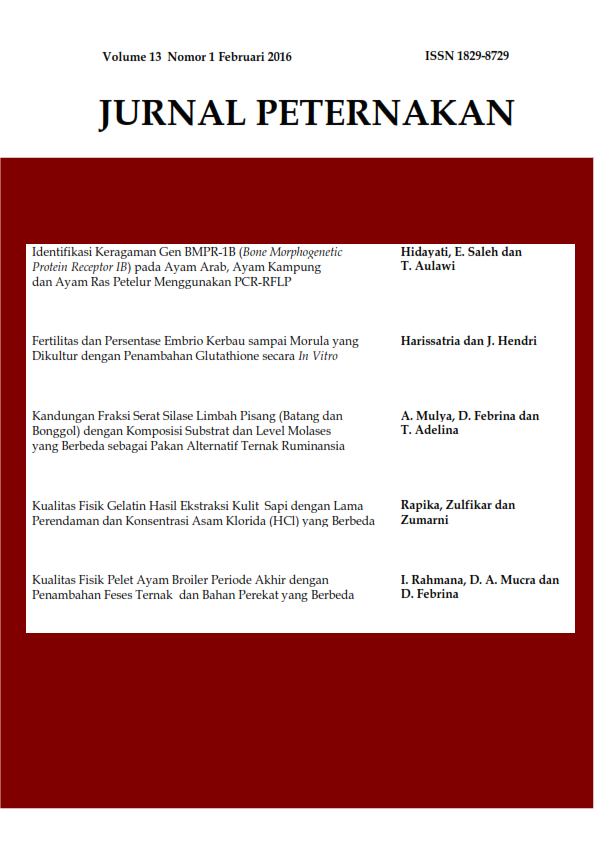KUALITAS FISIK GELATIN HASIL EKSTRAKSI KULIT SAPI DENGAN LAMA PERENDAMAN DAN KONSENTRASI ASAM KLORIDA (HCl) YANG BERBED
DOI:
https://doi.org/10.24014/jupet.v13i1.2386Keywords:
gelatin of bovine hide, hydrochloric acidAbstract
Gelatin is a compound hydrolysis of collagen fibers. The purpose of this research was to determine the influence of concentration of hydrochloric acid (HCl). and soaking time on the bovine hide making toward physical quality gelatin. The materials were bovine hide, hydrochloric acid and distilled water. Data were statistically analyzed by A Completely Random Design with factorial pattern consist two factors; hydrochloric acid concentration (3% and 5%) and soaking time (4, 8, 12 and 16 hours) with three times replications. Parameters measured were pH, gel strength, yield and viscosity. The result showed that pH, bloom strogh, yield and viscosity, centipoise (cP) of gelatin was 2.70-4.12, 53,33-185,00 g, 18.04-37.93% and 1.49-1,79, respectively. An interaction between hydrochloric acid and soaking time significantly (P˂0.01) influence in following categories: T pH, gel strength, viscosity and yield. It is conclude that the best combination treatments is HCl 3% and 12 hours of soaking soaking.
Downloads
Published
Issue
Section
License
The Authors submitting a manuscript do so on the understanding that if accepted for publication, copyright of the article shall be assigned to Jurnal Peternakan and published by Fakultas Pertanian dan Peternakan Universitas Islam Negeri Sultan Syarif Kasim Riau as publisher of the journal.
Authors who publish with this journal agree to the following terms:
Authors automatically transfer the copyright to the journal and grant the journal right of first publication with the work simultaneously licensed under a Creative Commons (CC BY) that allows others to share the work with an acknowledgement of the work's authorship and initial publication in this journal.
Authors are able to enter into separate permission for non-exclusive distribution of the journal's published version of the work (e.g., post it to an institutional repository or publish it in a book), with an acknowledgement of its initial publication in this journal.
Authors are permitted and encouraged to post their work online (e.g., in institutional repositories or on their website) prior to and during the submission process, as it can lead to productive exchanges, as well as earlier and greater citation of published work (See The Effect of Open Access).

